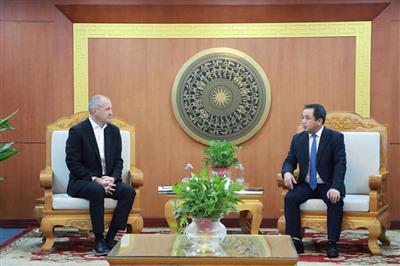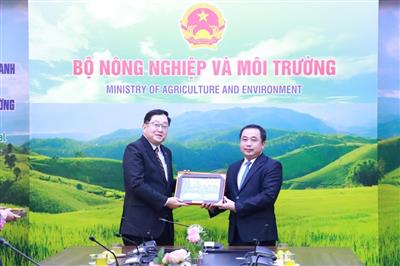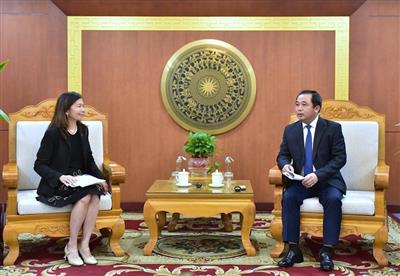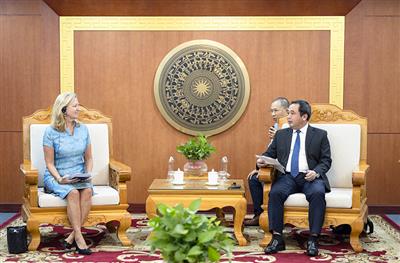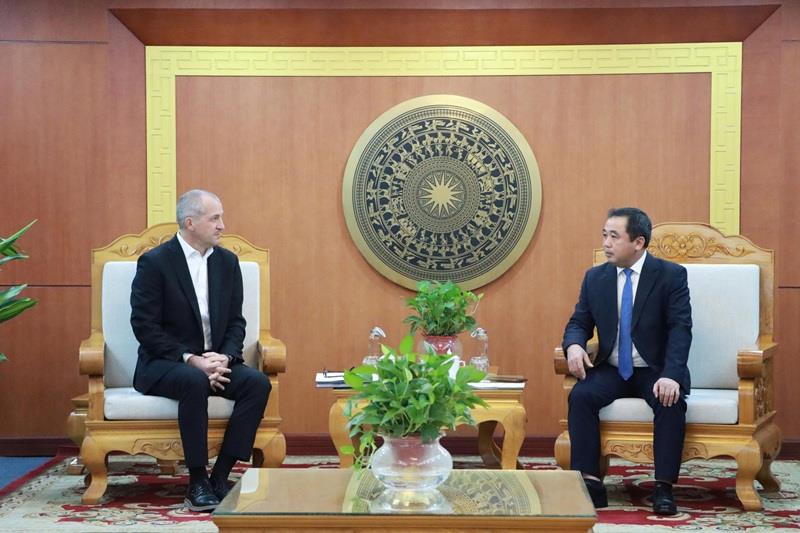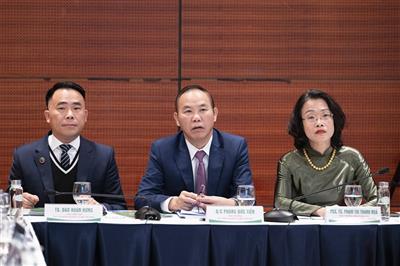
Perspectives from the Vietnam - Japan Ocean Policy Dialogue 2025
16/09/2025TN&MTThe Vietnam - Japan Ocean Policy Dialogue 2025 gathered policymakers, government officials, and experts from both countries for candid exchanges on legal frameworks, marine spatial planning (MSP), renewable energy development, and public-private cooperation. The wide-ranging perspectives from Vietnam and Japan not only underscored strong political commitment but also suggested concrete pathways toward the shared goal of building safe, sustainable, and resilient oceans.
Strengthening the legal framework as a driver of sustainable development
Dr. Pham Thi Gam, Head of Policy and Legal Division, Vietnam Agency of Seas and Islands

As Vietnam restructures its state apparatus for ocean governance, the challenge is to maintain unified oversight while empowering local authorities. Decrees No. 131/2025/ND-CP and 136/2025/ND-CP have devolved many responsibilities from district to commune level, while authorizing provincial People’s Committee chairpersons to manage marine areas. This step is designed to bring ocean governance closer to local realities.
At the same time, key legal instruments have been revised. The 2024 Law on Electricity has paved the way for offshore wind power by distinguishing between nearshore and offshore zones, and setting a clear order of priority — from projects supplying the national grid, to those producing green hydrogen and ammonia for domestic demand, to electricity and hydrogen for export. Offshore wind projects are eligible for preferential mechanisms, including long-term power purchase agreements (PPAs), exemptions or reductions in marine area and land-use fees, and investment and credit guarantees.
Decree No. 65/2025/ND-CP, amending Decrees 40/2016 and 11/2021, has updated provisions on coastal protection buffer zones, marine disposal of dredged material, and marine area allocation. Procedures have been simplified, including the principle that each marine area may be allocated to a single user to avoid overlaps. All research, surveys, and monitoring activities at sea must now undergo allocation procedures, with a maximum term of three years.
Looking ahead, we plan to submit amendments to several key laws, including the Law on Marine and Island Resources and Environment in 2026, along with revisions to the Biodiversity Law and Fisheries Law. The ultimate objective is to establish a coherent and transparent legal framework that fosters a sustainable blue economy while safeguarding national sovereignty and ecological integrity.
Japan’s comprehensive ocean policy: Balancing use and conservation
Mr. Honjo Hiroshi, Councillor, Ocean Policy Secretariat, Cabinet Office of Japan
.jpg)
Japan’s Basic Act on Ocean Policy, enacted in 2007, established the principle of balancing marine resource use with environmental conservation, reconciling economic benefits with ecological responsibility and maritime safety. To ensure implementation, the government created a robust coordination mechanism, including a Cabinet Minister for Ocean Policy, a Headquarters for Ocean Policy, a panel of scientific advisers, and the Ocean Policy Secretariat, ensuring cross-ministerial participation and alignment.
Building on this foundation, the Fourth Basic Plan on Ocean Policy was adopted in 2023, with two pillars: comprehensive maritime security and sustainable ocean development. The plan outlines 379 specific measures, each tied to clear KPIs, covering issues from climate change adaptation and disaster risk reduction to sustainable use of the Exclusive Economic Zone, Arctic research, infectious disease preparedness, marine industries, and international cooperation.
One current priority is accelerating offshore wind power and renewable energy as the foundation for green growth, decarbonization, and economic competitiveness. While progress has been made, the pace has fallen short of expectations. Since April 2024, the government has introduced additional priority measures to accelerate delivery, structured around six strategic missions implemented in five-year cycles, balancing long-term vision with short-term adaptability.
Through this approach, Japan seeks to share experiences with Vietnam, from institutional frameworks and MSP to technology adoption and public–private partnerships, in building safe and sustainable oceans.
Marine spatial planning to harness potential and safeguard national interests
Mr. Pham Van Lam, Deputy Head of Marine and Island Exploitation Management Division, Vietnam Agency of Seas and Islands

For the first time, Vietnam has developed a National Marine Spatial Plan (MSP) for 2021–2030, with a vision to 2045. As a national-level, multi-sectoral, and integrative plan, it operationalizes Resolution No. 36-NQ/TW and the National Master Plan. Its central aim is to ensure coherence across land, sea, and air planning, thereby advancing socio-economic development, environmental protection, and national sovereignty.
By 2030, the MSP targets effective allocation and management of marine space to minimize conflicts of use, aligned with objectives in the economy, society, environment, science and technology, defense, and international cooperation. Priority breakthroughs include building modern coastal and logistics infrastructure; promoting responsible, innovative marine and island tourism; advancing low-carbon, circular, and resilient fisheries; and rapidly scaling clean ocean-based energy, with offshore wind power as a top priority.
Vietnam’s offshore wind potential is estimated at nearly 6,000 MW, including 2,610 MW from fixed-bottom foundations and 3,380 MW from floating foundations. The MSP identifies over 17 million hectares of potential areas for offshore wind development, especially in the North, South Central, and Southern regions. Numerous companies have already submitted applications for survey permits, reflecting the strong investment appeal of this sector.
Beyond energy, the plan emphasizes emerging marine industries such as pharmaceuticals derived from marine organisms, advanced materials, and carbon capture, utilization, and storage (CCUS) in offshore geological formations. This comprehensive approach links economic growth with biodiversity conservation and national security, laying the foundation for a modern, competitive ocean economy.
Marine data: A foundation for transparency and effective governance
Mr. Katagiri Yasutaka, Councillor for Continental Shelf and Marine Surveys, Ocean Policy Secretariat, Cabinet Office of Japan
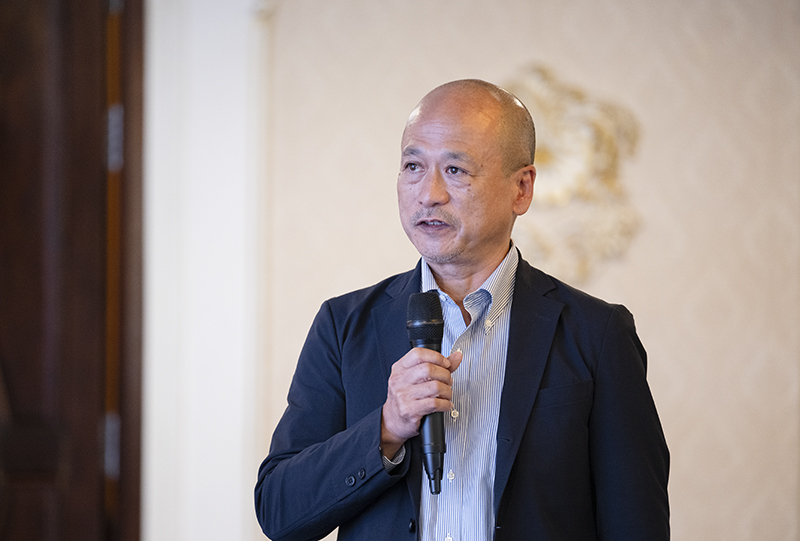
Japan’s experience with the Maritime Domain Awareness Situational Indication Linkages (MSIL) system provides a model for ocean data management. Operated by the Japan Coast Guard in cooperation with the Cabinet Office, MSIL consolidates, processes, and disseminates marine and coastal geospatial data to support security, safety, environmental monitoring, and economic activities.
The system integrates over 250 data layers, both static and real-time, including satellite imagery, AIS vessel tracking, ocean currents, wave height, weather alerts, and fishing port activity. Displayed through a web-based GIS platform, MSIL enables users, from offshore wind developers to regulators — to assess site suitability, safety, and efficiency based on layered information.
Crucially, MSIL is not only a collection tool but also an open-sharing platform: its web interface and APIs provide wide access, making it a practical situational awareness tool. For example, developers considering turbine installation can overlay vessel traffic density, current flows, wave conditions, and nearby fisheries before making investment decisions.
Effective use requires strong governance, continuous updates, data standardization, and cybersecurity. Performance is measured not only by the number of datasets but also by accessibility, daily users, and applications in disaster response, search and rescue, and resource management. A similar system in Vietnam could provide the backbone for evidence-based ocean governance, benefiting government agencies, businesses, and citizens alike.
Strengthening policies to drive green shipping
Ms. Tran Thi Tu Anh, Vietnam Maritime and Waterways Administration, Ministry of Construction
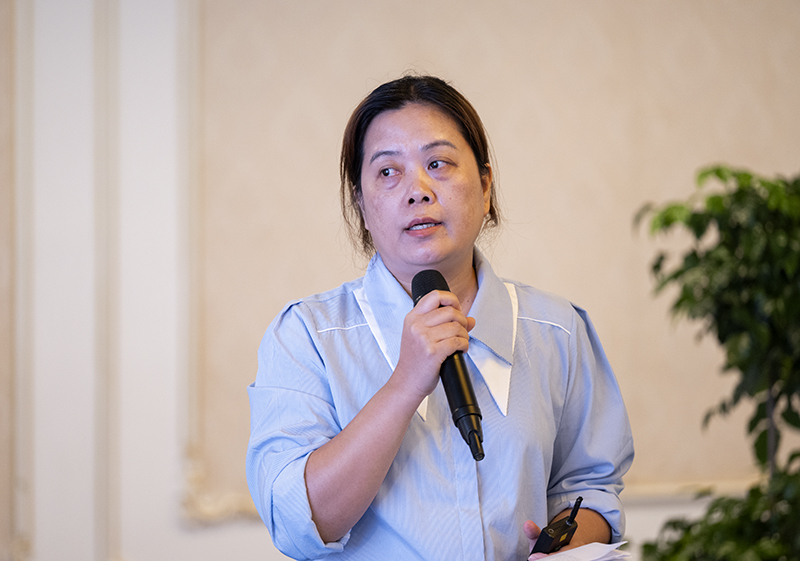
For Vietnam’s maritime sector to align with the global green transition, an enabling legal and policy framework is indispensable. Decisions such as 876/QD-TTg (2022) and 2027/QD-BGTVT have laid initial groundwork, but remain insufficient to provide a comprehensive framework for green ports, zero-emission vessels, and alternative marine fuels. Stronger measures are required in regulation, finance, and workforce development.
Globally, shipping accounts for 2–3% of CO₂ emissions. The IMO has set a Net Zero target for 2050, and leading countries are already investing in LNG, methanol, ammonia, hydrogen, green ports, and shore power technologies. In Vietnam, although initial steps have been taken, challenges remain: inadequate infrastructure for clean fuels, limited expertise in green technologies, high capital costs with long payback periods, and the absence of green credit schemes or attractive tax incentives.
The government should swiftly establish regulations on green ports and zero-emission vessels, while harmonizing technical standards with the IMO, EU, and regional frameworks. Incentives should include preferential credit, tax reductions, and exemptions. Training programs must be expanded to cover shore power operations, sustainable fuel handling, and dual-fuel ship operations. Vietnam should also actively engage in international green shipping corridors to attract investment, access advanced technologies, and accelerate its green transition.
The perspectives shared at the Vietnam – Japan Ocean Policy Dialogue 2025 outlined a multi-dimensional picture: from legal reforms and marine spatial planning to data management, renewable energy, and maritime decarbonization. While approaches may differ, the common thread was clear, reaffirming the importance of international cooperation and policy innovation to transform ocean potential into a driver of sustainable development, safeguard national interests, and contribute to global goals.
The Vietnam – Japan Ocean Policy Dialogue 2025 took place on 8 September in Hanoi, co-organized by the Vietnam Agency of Seas and Islands under the Ministry of Agriculture and Environment, and the Ocean Policy Secretariat of the Cabinet Office of Japan. The event was attended by leaders of ocean management agencies from both countries, alongside representatives from ministries, research institutes, associations, and businesses. As a continuation of the 2024 dialogue in Tokyo, and based on the 2018 Memorandum of Cooperation on marine and ocean policy, this year’s dialogue focused on exchanging updates on policies, planning, and cooperative solutions for resource use, environmental protection, and sustainable development of the blue economy.
Ngoc Huyen


